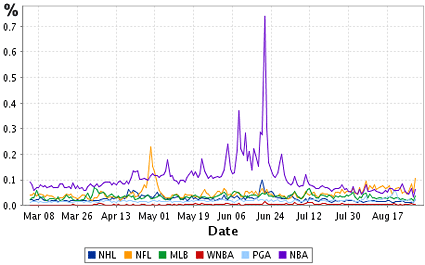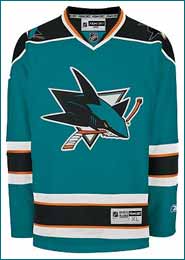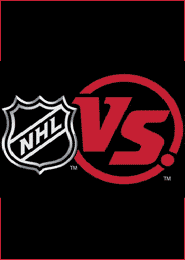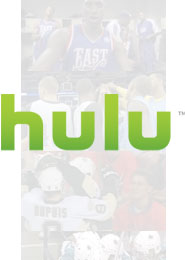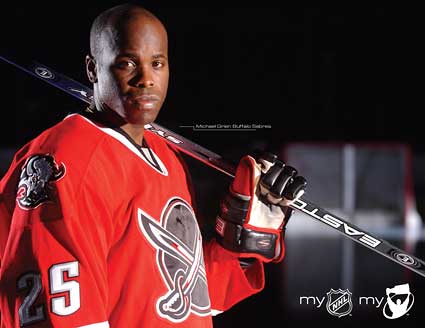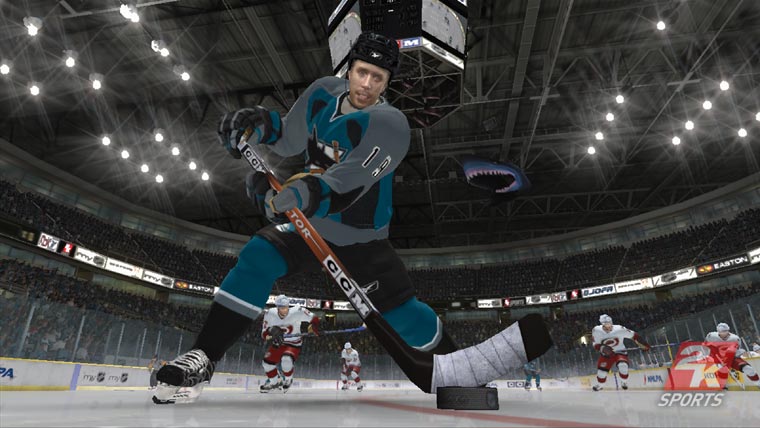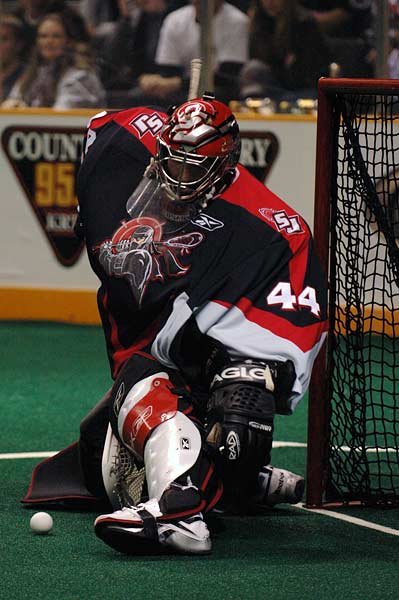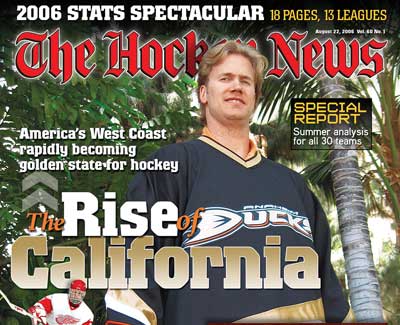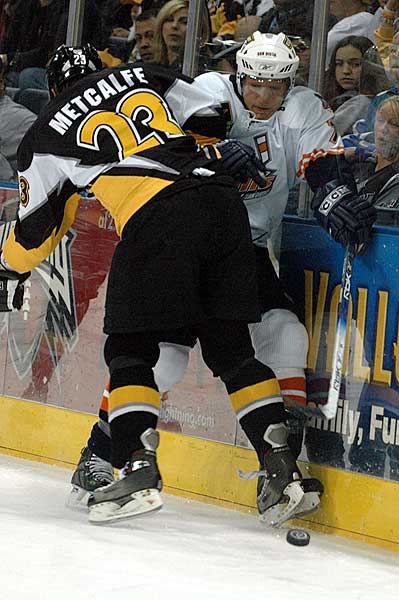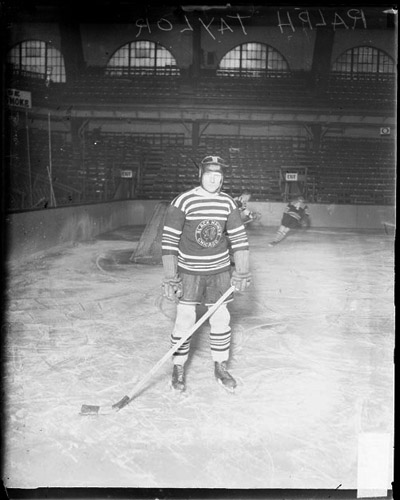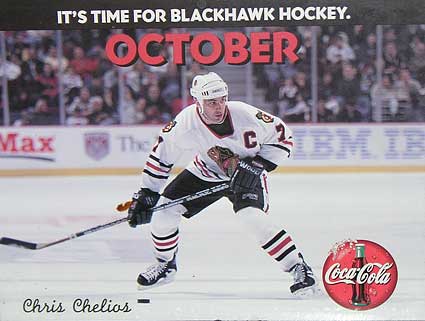Earlier this month, radio host Ben Maller
reported that the Los Angeles Times would no longer send reporters on the road to cover the Anaheim Mighty Ducks or the Los Angeles Kings. Maller noted that the weekly NHL column written by Hockey Hall of Fame inductee
Helene Elliott would also be pulled.
Southern California blog
L.A. Observed contacted Times Sports Editor Randy Harvey, who mentioned that Elliott will still write about hockey often. L.A. Observed also noted the fan reaction from locals on
LetsgoKings.com.
This decision will impact hockey fans outside of California. During the lockout, Helene Elliott and Chris Foster of the Los Angeles Times were two major sources of information while most newspapers were reducing staff. On several big stories, a lot of the information making its way around the blogs and the wires could be traced back to the L.A. Times sports section.
20-year journalism veteran Steve Gosset at the blog
Reality Bites Back compares the L.A. Times cost-saving reduced coverage with that of the New York Times, and asks what that will mean for fans of the sport.
So, when the nation's fourth-largest newspaper decides to curtail coverage of a still-major sport, what hope is there for smaller newspapers? Actually, little or none, as they don't make road trips either.
Hey, at least the Tribune gang in Hollywood is actually covering the teams when they're home. The New York Times has cut back to one hockey writer who covers the Rangers, although even that team was subject to road wire coverage occasionally.
As for the New York Islanders and New Jersey Devils, who between them have won seven Stanley Cups, they might as well have not even existed. Rare was a reporter sent even to a home game. That the Times relied instead on the AP was apparently viewed with little embarrassment on West 43rd St.
And with word that the Times will shrink in size by 2008, cutting the newshole by 5 percent, expect a lot more of the same.
The Sports Editor of the New York Times, Tom Jolly, is answering questions from readers all this week on
nytimes.com. Hockey fan Fred Winters asked Jolly about the lack of New York Ranger coverage in the Grey Lady:
[Q] As a longtime NY Rangers fan, I am certainly used to frustration both due to the team's historic futility and from the relatively anemic coverage and analysis of both the Rangers and the NHL in the NY media, including the Times. I hope you can shed some light on this. As the Rangers prepare to field their second surprisingly interesting and competitive team in as many years, does The Times Sports section plan any special or supplemental coverage for the upcoming season? -- Fred Winters
[A] Your email is one of several from fans who would like to see more coverage of a particular sport. One of our challenges is deciding how best to allocate our resources, both in terms of the number of reporters we have and in the space available in the sports section.
Decisions on what we are going to cover are constantly under discussion and change by the hour, depending on news. Remember also that we are an international news organization, responsible for covering not only the local teams but news of significance around the world.
In other words, we have to make some tough choices. Our approach is to cover the teams that have the biggest following, and that generally includes the Rangers, especially when they are playing well. But while the lockout may have helped solve the NHL's financial problems, it had the unintended result of showing that hockey's following is significantly behind that of football, baseball and basketball.
That puts hockey in the category of sports where we look for opportunities to do the big stories that we think will be of interest, or use, to the most readers. Last year, we wrote major stories on the resurgence of the Edmonton Oilers, the NHL official responsible for enforcing new rules designed to increase scoring, the five Czechs who formed the heart of the Rangers and other stories.
Look for more of the same in the coming season.
Jolly's response was posted in full because it is important for the league to take notice of his comments. The Los Angeles Times, the New York Times, and the Washington Post, three of the largest papers in the U.S. have all expressed similar concerns about the league. In each instance, editors will cite individual stories that prove that they still keep an eye on the sport. It takes regular day-in-and-day-out coverage to build a fan base, and that is the coverage that is drying up.
Adam Proteau gives his usual colorful advice courtesy of the Hockey News and ESPN,
The NHL's next step: a personality infusion.
Proteau believes that the NHL is underperfoming (to put it mildly) when marketing its main attraction, its players. Unfortunately, he uses a quote by Art Ross trophy winner Joe Thornton to illustrate his point. I am tempted to send
this shirt to Mr. Proteau to help cheer him up.
The bottom line is that the NHL far exceeded expectations after a brutal season-ending lockout. The
30-team lottery to determine Sidney Crosby's future,
unprecedented free agent movement, new rules meant to open up the game, a television broadcast partner in the U.S. willing to try new ideas, two teammates winning the Art Ross and Rocket Richard trophies, five 50-goal scorers (Jonathan Cheechoo, Jaromir Jagr, Alexander Ovechkin, Ilya Kovalchuk, Dany Heatley), another Canadian team in the Stanley Cup finals, all helped boost interest in the NHL last season.
The NHL got it right. The question now is whether they will continue to innovate and build the fan base, or if last year was a creative anomaly.
Traditionally, when hockey fans do not get the coverage they want from television, radio, or in print, they would move online. It began 15 years ago when fans would dial into BBS bulletin boards set up by
Chuq Von Rospach. They would post the latest news, discuss the latest trades, and compensate for a lack of coverage by creating their own distribution of what news was available. All of this happened before the internet was opened up to the public.
The NHL can mitigate some of the above problems by expanding and offering compelling content that will keep fans informed and entertained. The N.Y. and L.A. Times cited cost-cutting measures as a reason for reducing hockey coverage, but they are also missing a financial opportunity. Put expanded scouting reports, video scouting reports, in-depth informative interviews behind a paid wall at opportune times and hockey fans will pay to find more information.
The NHL should also look into non-traditional ways to promote the sport. During the playoffs, I contacted the media relations directors for the Anaheim Mighty Ducks and Los Angeles Kings (among several others) and asked them about working with blogs to cover their teams. The Ducks had a policy of only working with major media sources. The Los Angeles Kings Director of Communications Jeff Moeller also noted that they do not have a policy with regards to hockey blogs, but he did answer a
few questions about their efforts to draw fans back to the sport.
The NHL took a step in the right direction recently by adding Paul Kukla of
Kukla's Korner to its stable of NHL.com bloggers. The Drudge Report of the NHL, P.K. scours the internet for hockey news and occasionally competes with major media sources for breaking information.
Paul's new blog can be found
here for August. On Wednesday, he spoke to San Jose Sharks equipment manager Mike Aldrich:
Hey, aren't you Mike Aldrich, head equipment manager of the San Jose Sharks? What are you up to these days? You can't be doing much can you, relaxing, catching up on some sleep, maybe taking a full month off before the season starts?
"Ha, I wish!!! Soon after the season ended for us in June, the equipment staff did most of the clean up work and took physical inventory of all of the equipment."
Then you took a long break, right?
"Most of our equipment orders had to be in by the end of June. Once the NHL Draft was completed, the hockey department began to compile a list of potential players for development camps, rookie tournaments and, of course, the Sharks' main training camp. We spent the better part of the summer contacting players, gathering their personal information on custom pieces of equipment such as skates, gloves and sticks. Then, beginning last week, the staff starts prep work to make sure all of the Shark's facilities are in good shape and organized for upcoming season."
I would be remiss if I did not mention Washington Capitals owner Ted Leonsis inviting blogger Eric McErlain to a game. Eric wrote about the evening on offwing.com
here and
here. They discussed a few of the issues repeated in this blog post, but more importantly it demonstrated an owner individually headed in a direction that the NHL needs to move towards as a whole.
The league needs to open up on the media front in a similar fashion to the way it opened up on the ice last season. There is no golden solution, but if the NHL "keeps its feet moving" in hockey parlance, it can build on the gains it made last year.
[Update] More on the Washington Post from my interview last season with Washington Capitals owner
Ted Leonsis:
[Q] What do you think about (Eric McErlain's) suggestion that the Washington media has downgraded coverage of the Capitals this season.
[TL] Very much so. Last week there were days when we did not have a single word in the newspaper. Basically I have two reactions. The first reaction is that we have to keep working the press, make news, and create an environment where they are interested in writing about us. The second is that the Washington Post is shrinking. I grew up in a world where Moore's Law ruled. Every year you would offer more and more, and charge less and less. Petroleum-based print products are on the opposite role. They charge more and more and offer less and less. And the Washington Post readership is significantly down year over year. What I said is that they are one of the outlets, and we have to create our own outlet...
[Q] Do you think it is important to use the Washington Post to appeal to non-traditional fans. Not only fans who did not renew their season tickets, but maybe fans who have never been to a game, or have only been to a handful of games?
[TL] ...We are basically saying that the Washington Post and Washington Times are outlets. Important, but not the be all end all that newspapers used to be. In our market we have cable, broadcast, radio, internet, we have search. We have our website. We are trying to encourage the blogosphere. We want fans to build their own homepages. And we even offer them tools on our website to help people blog. We want 1,000 communication flowers to bloom. That would be in our best interest, but also in the consumers best interest. The concept of an editor and a couple of reporters deciding what is news is kind of 19th Century. We are in the 21st Century. So I pay the Washington Post respect, but they are not my first and last stop for everything we do.
Similarly, blogs are not the be-all-end-all of what will improve the NHL. They are one good option, and one I think would help. Each team should evaluate them on an individual basis to see if working with them is the right fit for their organization.
[Update2]
The newspaper industry: More media, less news - The Economist.
[Update3] Philadelphia Inquirer writer Tim Panaccio obtained more details of the Los Angeles Times planned
hockey coverage from Times sports editor Randy Harvey:
Finally, the Los Angeles Times has decided it no longer will send its hockey writers to cover Kings and Ducks road games. It's a frightening day in the NHL when one of the world's largest newspapers decides to write off hockey. Last fall, the New York Times decided not to cover the Rangers on the road, until it became apparent that the newspaper could no longer ignore how good they were. "There are some markets in the United States in which hockey remains one of the major sports," and "some in which it has become a niche sport," Randy Harvey, sports editor of the Los Angeles Times, said in an e-mail interview. "In our market, it's a niche sport." That hockey is viewed in such terms should be of grave concern to commissioner Gary Bettman.
The "niche sport" comment makes the decision a little more serious for the NHL. Panaccio calling for Gary Bettman to take notice is the same reaction this blog posted
here. Thanks to Steven Ovadia at
Puck Update for the link.
